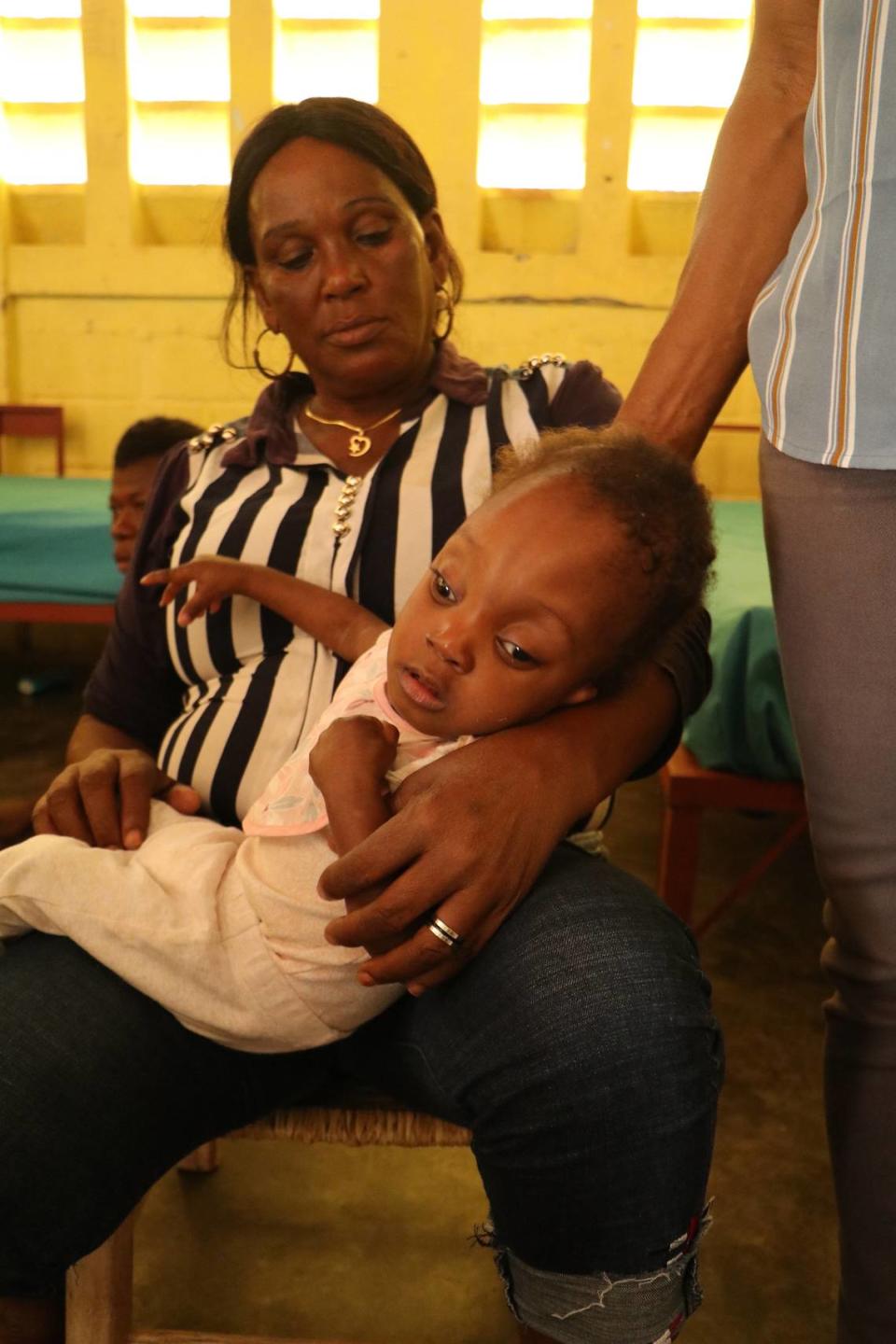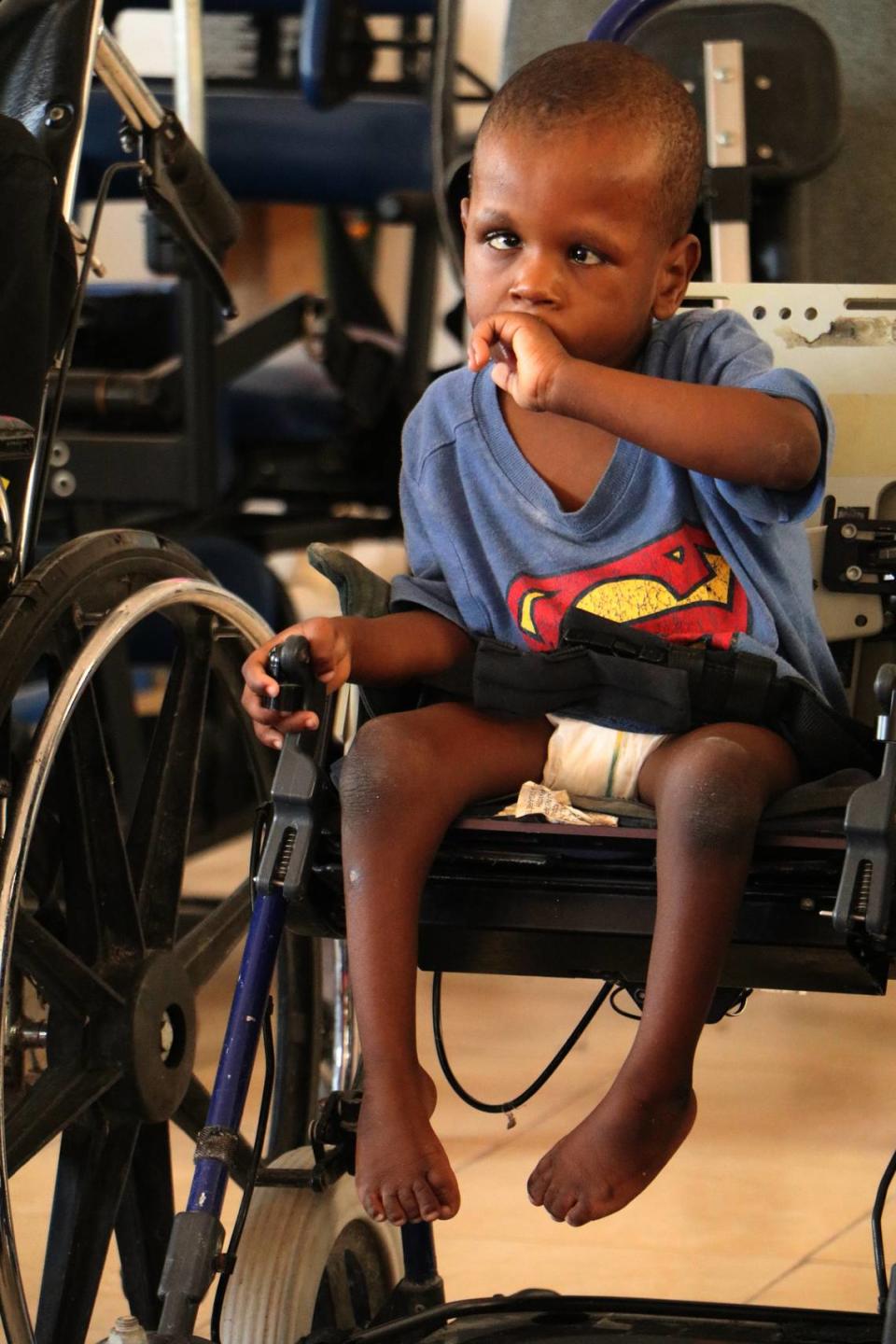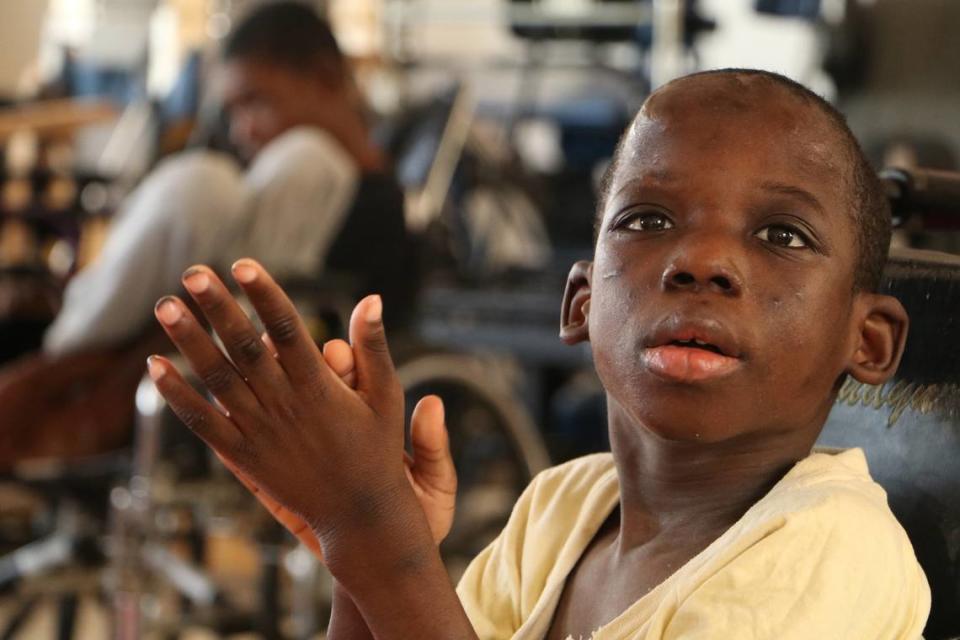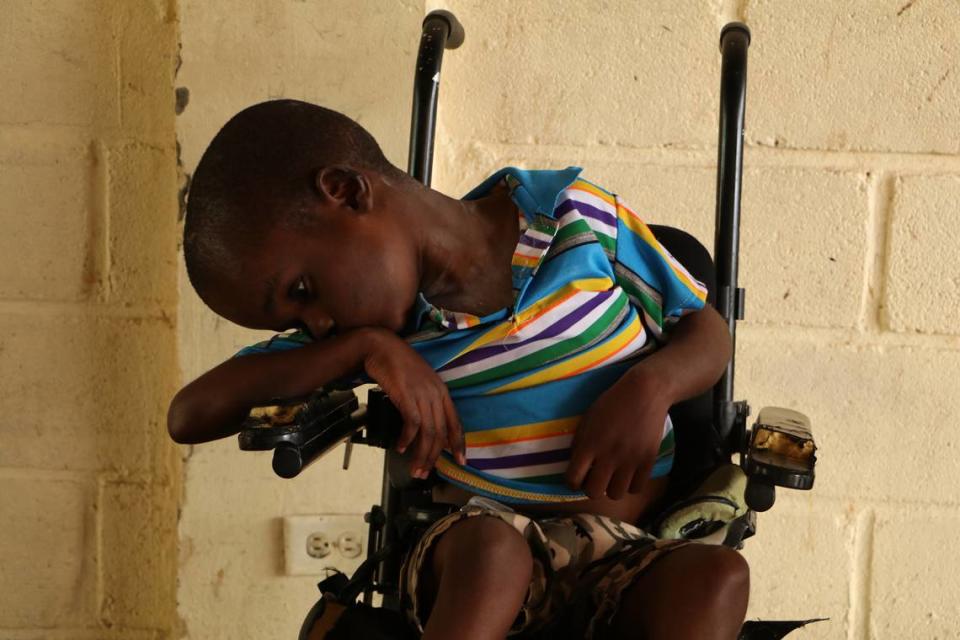Haiti gangs take aim at disabled children: ‘Put those kids out of their misery or we will’
Born with cerebral palsy and a build-up of fluid in his brain, Wasserman, 7 years old, hadn’t eaten in days when he and two other severely disabled children were rushed from their orphanage outside Port-au-Prince to a hospital in the Haitian capital because they were suffering from uncontrollable seizures.
As they passed a soccer field near a shantytown along a major thoroughfare, their truck suddenly stopped. Heavily armed men had taken over the road and were ordering traffic to turn back.
“The gangs cracked our windshield and threatened to shoot our tires if we didn’t turn around,” said Susie Krabacher, who has been caring for Haiti’s disabled, abandoned and orphaned children since 1994 and was tracking the trip three weeks ago from her home in Aspen, Colorado. “Even though we had a dying kid in the car, they were just laughing at us.”
By the time the truck made the hour-long trip back to Krabacher’s HaitiChildren orphanage, Wasserman was dead. The other two, Jean Claude, 14, and Babette, 20, died soon after.
“We’ve had three kids die within three days of each other and another one this morning because of all this violence,” said Krabacher, who co-founded the orphanage with her husband.

Two years after the assassination of President Jovenel Moïse, the violence in Haiti by all accounts grows worse daily. More than 80% of the capital is controlled by armed gangs continually battling over turf. Children are unable to go to school, families are starving and hundreds of thousands of people have been displaced from their homes amid an unending frenzy of rapes, kidnappings and killings.
And yet, even among a population facing daily depredations, the country’s abandoned and disabled children stand out.
There is a solution at hand for the 62 disabled kids and adults at HaitiChildren, a lifesaving opportunity that would get them out of the country and into the care of an internationally renowned charity in Jamaica until it is safe to return. A respected Catholic priest, a former U.S. ambassador and the prime minister and foreign minister of Jamaica are pushing for the move.
But as with all things in Haiti, nothing is easy.
Krabacher has been trying to move the kids, many of whom she has been watching over since they were infants, into the care of Mustard Seed Communities in Jamaica since June.
But her efforts are being blocked by an entrenched Haitian bureaucracy, a troubled child-welfare system and a disturbing history of children being whisked out of the country in times of crisis never to be seen or heard from again.
Abandoned by their families in hospital wards or on roadways, the kids at HaitiChildren have been diagnosed with a variety of disabilities, including Down syndrome, multiple sclerosis, autism and brain injury from seizures. At least one little boy is HIV positive. Those who do not use a wheelchair have difficulty walking. They are conditions that not only require specialized care but also make them outcasts. Stigmatized, they are called kokobe, meaning “cripple” in Creole.
A gang invaded the orphanage last week, pointing their guns and searching the place as they taunted the kids in wheelchairs.
“The gangs have been shouting, ‘You need to put those kids out of their misery or we will put them out,’ ” Krabacher said.
Children who left after the earthquake
Arielle Jeanty Villedrouin, the director of Haiti’s child welfare agency, the Institute for Social Welfare and Research, said the matter is “very complicated.”
Other than a letter from Mustard Seed and a single phone call from Krabacher, Villedrouin says she doesn’t have anything official from the Jamaican government and no one has come to see her about moving the children. Instead, she said, Krabacher and her supporters have pursued a pressure campaign involving Haiti Prime Minister Ariel Henry, believing it will get her to agree to ship the children off to another country.
Henry, one of the country’s few neurosurgeons, has spoken to Villedrouin about the request but has not said what he plans to do. She calls the situation “problematic.”
Villedrouin said if she were to “open this door” she doesn’t know what will happen to the children. “I have no control over what is happening in the other country, and I don’t know what they will do with the children.”
It’s not that she isn’t sympathetic to the plight of children caught in the cross-hairs of Haiti’s violent armed gangs, Villedrouin said. She has agreed in some circumstances to allow sick children to leave Haiti, but decisions are made on a case-by-case basis and after doctors and caregivers “have come and explained the situation.”

In their telephone conversation, Villedrouin said she explained to Krabacher that as the chief protector of Haiti’s children, she just can’t throw the country’s doors open for everyone who wants to leave. She also noted that every time Haiti finds itself in crisis, children become prey for exploitation and traffickers. That was the case after the catastrophic 2010 earthquake when children, in an unprecedented baby airlift, were taken out of Haiti, some without the consent of the government or their parents.
“Up to this day, we are trying to document children who left after the earthquake,” Villedrouin said. “We don’t know who left and who didn’t.”
There is also another complication: Some of the children are technically not orphans.
A 2017 study by the London-based nonprofit Lumos, founded by Harry Potter author J.K. Rowling, estimated that there were at least 30,000 children living in orphanages in Haiti. However, more than 80% are not actually orphans because they have at least one living parent, the study said. Because of the country’s deep poverty, parents often place their children in these institutions believing they will be better cared for.
Villedrouin, who has prioritized the removal of children from orphanages and reuniting them with their parents, said that before the kids at HaitiChildren could be sent to Jamaica she would need to contact every parent to get their consent.
“I just can’t take people’s children and send them to another country,” she said.
Villedrouin said she has “a bunch of requests” on her desk from orphanages seeking to relocate children out of Haiti. With the exception of Krabacher, all are trying to go across the border to the Dominican Republic.
The question she asks, Villedrouin said, is why can’t they do what others have done and relocate to Haitian cities where the gang violence isn’t as intense as in Port-au-Prince?
Krabacher responds that most of the kids in her care are in need of specialized care that is available only in the Haitian capital.
“Our once-thriving children are dying due to lack of medical services,” Krabacher said. “We will not become a hospice center for children who have an opportunity to thrive if allowed to leave Haiti temporarily.”
“We just really want to assist”
Mustard Seed Communities was founded in 1978 by Roman Catholic Rev. Monsignor Gregory Ramkissoon when he was still a university student and saw disabled children abandoned on the streets of Jamaica. Today, what the Trinidad-born priest began in one wooden building is now a nonprofit operating 13 group homes across Jamaica.
The Catholic charity also has homes in Nicaragua, the Dominican Republic and Zimbabwe, and will soon open a home in Malawi. All are administered from Jamaica, said David Silvera, Mustard Seed’s head of business development.
“We just really want to assist in caring for these disabled children,” he said about the HaitiChildren kids.

Krabacher first sought Mustard Seed’s help on May 30. She wrote Ramkissoon, saying that she had 62 disabled children and dependents who were at risk of disease or death because food, critical medicine and medical care were being “blockaded by military-style gang interference.”
Ramkissoon wrote to Jamaica Foreign Minister Kamina Johnson Smith seeking her assistance with the Haitian government. The outreach was timed to a recent visit by Henry to Kingston.
Everywhere Henry went, Silvera said, “he was being told, ‘Let Mustard Seed help you.’ ”
The charity also reached out to a former U.S. ambassador to Jamaica, Luis Moreno. A retired diplomat, Moreno had also served as deputy chief of mission in Port-au-Prince.
“Working with Haitian entities at the best of times can be incredibly difficult. Under the present circumstances, it is nearly impossible,” said Moreno, who wrote to the Haitian government vouching for the organization and Ramkissoon. “We are determined to exhaust every possibility to get the severely disabled children and some adults to Mustard Seed in Jamaica, where I know they will be taken incredibly good care of.”
Ramkisson “is one of the few people who I would totally put my hand in the fire for,” Moreno added. “His dedication is unmatched.”
Silvera said Villedrouin initially asked for “an ironclad guarantee” that Mustard Seed would not put any of the children up for adoption and that they would returned to Haiti once the situation improves.
Silvera said after giving their word, he thought they were in the clear to start getting the group to Jamaica. Then Villedrouin made a third request: He must fly to Haiti to discuss the matter with her.
That was two days before an American nurse from New Hampshire and her daughter were kidnapped in Port-au-Prince. That same day, the U.S. Embassy, ordered the withdrawal of non-emergency personnel due to the escalating violence and kidnappings.
Silvera, whose own family migrated to Jamaica from Haiti, said not even his Haitian roots were enough to convince his advisers, or his wife, that he should make the trip.
As he considers the plight of the children, he said, he can’t help but think: “They’d rather the children die than leave Haiti.”
From slave route to gang crossroads
Arcahaie, the town where HaitiChildren is located, is on the edge of the west regional department that encompasses Port-au-Prince, and it borders the Artibonite mountains.
Today Arcahaie, a historic city where the leader of Haiti’s successful slave revolution created the country’s two-colored flag, is smack in the middle of Haiti’s gang warfare.

In November, gangs cut off access to Route National 1 connecting the city to Port-au-Prince, and that same month, eight of the orphanage’s employees, including four nurses, were kidnapped and their bus taken.
The kidnapping occurred on the same Port-au-Prince road where Wasserman, Babette and Jean-Claude were prevented from crossing, Krabacher said, when they were only two miles from the trauma hospital.
“We have so many needless deaths and it’s just unfathomable to me that nobody will let us get those kids out of there,” she said.
In March, not far from the orphanage, two popular beach resorts, Wahoo Bay Beach and Ouanga Bay Beach, were attacked and looted by gangs along the white-sand beach of Côte-des-Arcadins, also known as the Haitian Riviera. In July, two gangs operating in the Artibonite Valley carried out summary executions, killing at least 29 people during what one watchdog group described as “a real nightmare” month. In August, escalating gang violence in Port-au-Prince catapulted most of the capital into a no-go war zone.
“We’re getting harassed all of the time,” Krabacher said, noting that armed men patrol the streets around her orphanage blocking access to both the main road and the sea, which they sometimes use to circumvent the gangs. “When we’ve pulled out of the gate, many times in the past month, they stop the car. They won’t let us pass to get to the hospital in Port-au-Prince.
“If we can get them to a hospital within an hour,” she added, “we’ve always been able to save them, but we’re not equipped to save them without critical care.”
Late last month, the consequences of this turned into another round of tears when another one of her kids, Pedro, 27, died in his sleep.

Speaking about the gangs, Krabacher, who hasn’t been able to visit the facility since March, said she has never seen such “demonic behavior in my life.”
The children “are dying terrible deaths,” she added.
Krabacher, who knows Henry, said she has tried to appeal to the prime minister directly but has had no luck. Villedrouin, she said, told her she would need to go to court to adopt each of the children into her custody.
“What courts?” Krabacher said, referring to the dysfunctional judicial system that has been in tatters since the violence began.
She says even though she is not the kids’ biological mother, she has raised them since they were infants, and most of them call her “Mom.”
“Do you know how it feels to lose four in two weeks? We had a triple funeral and our poor little kids... those who are mentally impaired they don’t understand it,” she said. “And I’m not able to go and bury my own kids.”

